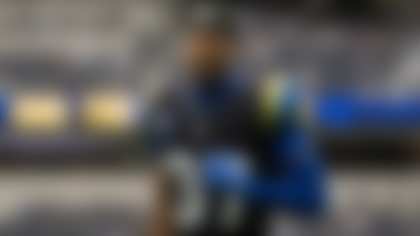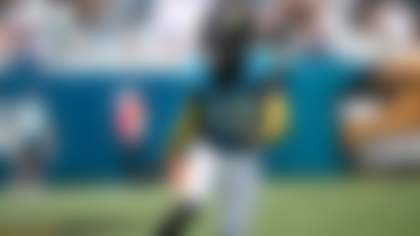DAVIE, Fla. -- The sweat is beading on Ricky Williams' head, glistening in a sun-kissed South Florida afternoon. His jersey is stained with dirt, and there are almost as many chunks of grass stuck on his helmet as there are on his cleats.
It's the end of another two-a-day practice, and the Miami Dolphins running back is headed to the film room, then to lift weights and study his playbook. Williams is working hard again, showing the kind of effort that once made him the NFL's leading rusher and a Heisman Trophy winner in college.
He still has that quiet demeanor that can make him seem detached from football, appearing as if he doesn't care about the game or how he's perceived. His past behavior might tell the same story: the early retirement, the marijuana use and the subsequent suspensions.
He's been labeled a quitter by some, selfish by others, and his free spirit nature has opened him up to punch lines. But the controversial running back, who failed the league's substance abuse test five times, cares about his football legacy. For him, this season is partly about changing how he will be remembered.
"The way I left made it difficult," Williams said. "To come back and clear my name is important to me."
At 31, what else is important?
"No. 1, it's a good salary," he said. "There's not many jobs where you make this kind of money."
So far, he's earning it.
Williams didn't miss a voluntary practice in Miami's strict offseason workout program under the new Bill Parcells-led regime. He has bulked up to about 230 pounds, the weight he played at in his prime. And with Pro Bowlers Jason Taylor and Zach Thomas long gone, Williams is trying to be a leader.
"He finishes every run. Within his individual drills, I see the guy working hard to get better," first-year coach Tony Sparano said. "I think the guy shows up each day, and he has a purpose when he practices.
He's been perhaps the best player on the field during training camp. His talent is why no less than four Miami coaching staffs have put their faith -- and the team's future -- on his legs, even though he's flaked out on them every time. Of course, the question with Williams has never been about his skills. It's how long will he last?
"That's always going to be in the back of some people's minds -- can the guy make it?" defensive end Vonnie Holliday said. "We know that when Ricky Williams gets on the field and suits up that he's going to give you 100 percent effort, and you know that he's going to go to the wall for you.
"He's an unbelievable player. But it's just keeping him on the field. It's like one of those things, you have to show me. You have to go out and give me a full season. I don't think anybody's worried about it. But it's just a matter of him going out and getting it done."
Williams' history has led to such skepticism.
Then-New Orleans coach Mike Ditka did nearly everything but sell the franchise to move up to the fifth spot in the 1999 NFL draft and select Williams, who was traded to Miami after three up-and-down seasons and was placed in the league's substance abuse program soon after. Ditka was fired for the team's poor performance.
Williams had an NFL-best 1,853 yards rushing and 16 touchdowns in the 2002 season. Then his career -- and the Dolphins franchise -- was torpedoed by a second positive drug test the following year and a suspension for the first four games. Just before the start of training camp in 2004, he tested positive for marijuana a third time and announced he was going to retire.
Williams took a soul-searching trip around the world, which included living in tents in Australia and India. He began studying holistic medicine, practicing yoga and teaching his beliefs before making a return to football.
"Ricky is really weird," linebacker Channing Crowder joked. "Why he did all that we'll never know."
His shy nature has added to Williams' oddball reputation.
He has conducted post-game interviews wearing his helmet and a tinted visor to avoid eye contact. He posed on the cover of ESPN the Magazine in a wedding dress with Ditka. And he's been known to go into the darkroom at Dolphin Stadium after games and talk with photographers editing his pictures, part of his interest in the craft.
Yoga and photography keep him grounded, Williams says now. Somewhere between stretching into yoga's downward-facing dogs and fiddling with the depth of field on his cameras, Williams said his hobbies have replaced his need for drugs.
"I got a whole bag of tricks to stay focused," he said.
The Dolphins, coming off an embarrassing 1-15 season, are banking that he does.
Williams returned last year, but his comeback lasted less than one half. He gained only 15 yards on six carries before he fumbled, was stepped on and tore his chest muscle against Pittsburgh. Teamed with Ronnie Brown, who was on pace for a career season in 2007 before he tore ligament in his right knee, Miami's running backs have lofty expectations.
The duo is hoping to become the first NFL tandem in 23 years to each rush for 1,000 yards. That feat has not been accomplished in Miami since Larry Csonka and Mercury Morris did it in the 1972 perfect season.
"For myself and Ricky, the positive competition is always good," Brown said. "We're just trying to make each other better."
Somewhere in his travels -- including a brief stint in the Canadian Football League -- Williams said he found his peace. His dreadlocks and beard are gone, part of "growing up" he says, and his speed seems to have returned.
He wants to go back to college and "find a real job" after football to help support his four children. When pressed about how long he plans to play, he could only mutter, "We'll see."
And that's how it's always been with Williams -- wait and see. What could have been a Hall of Fame career had he stayed in the game and stayed clean might always be incomplete.
"If nothing else," Williams said, "I just want to make sure I don't do anything to make it any worse."
Copyright 2008 by The Associated Press



